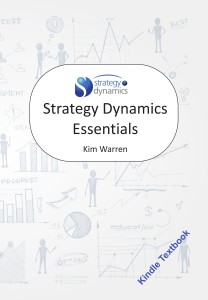Kim Warren on Strategy
Strategy insights and living business models
Business case for sustainability
Michael Olson of Pleiades Technology Futures just pointed me to what looks some solid materials on how to make the business case for investing in sustainability from Bob Willard at Sustainability Advantage. This contrasts strongly with much of the well-meaning but mostly futile aspirations of many sustainability advocates.
Bob’s approach is extremely clear and expressed in terms that would likely grab exec attention – pointing out in particular that many substantial investments in sustainability offer a perfectly good financial return in conventional terms, even before adding the intangible value of external benefits. We can go further though – Bob’s seven-stage sustainability change process in summary goes [with much more behind it!] …
1 Wake up and decide
2 Inspire shared vision
3 Assess current realities
4 Develop strategies
5 Build the case for change
6 Mobilize commitment
7 Embed and Align
… and that alone would seem to make a case for a great deal of change and investment in many companies. The main unresolved issue, though, is exactly the same in this Sustainability domain as it is in strategy generally – when you have got through steps 1-3 you have to ‘4. Develop Strategies’ and ‘5. Build the Case for Change’.
But without a rigorous model of how the business system actually works and delivers performance [which is why many firms did not have strategies to avoid, prepare for, or deal with the current crisis], it will be tough to do steps 4 and 5 well, and if that’s not in place, steps 6 [Mobilise] and 7 [Embed] will be tough too.
All that is needed for strategy dynamics to encompass this is to extend the business model beyond the firm boundaries to incorporate those sustainability issues [a trivial example being to add fuel consumption to the Ryanair model, plus the energy and raw materials used to make its aircraft, etc]. Such extensions are easy to see in many of the sustainability-related initiatives being pursued by the likes of Walmart.
The tricky challenge comes when the sustainability initiatives are not self-evidently cost effective, but are realised – or can be made to be so – when management gets to work on the wider system. E.g. many leading UK firms are doing things that clearly have a negative conventional ROI, but generate long-term returns when the combined effects of accumulating intangible resources, plus self-reinforcing feedback, are engineered into the system.
NEW: join strategy dynamics on LinkedIn.
Copyright © 2026 Kim Warren on Strategy. All rights reserved

